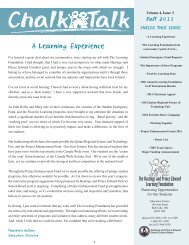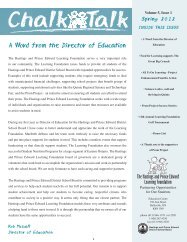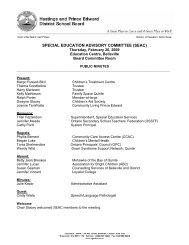Grade 11 Healthy Active Living Education Additional Supports ...
Grade 11 Healthy Active Living Education Additional Supports ...
Grade 11 Healthy Active Living Education Additional Supports ...
You also want an ePaper? Increase the reach of your titles
YUMPU automatically turns print PDFs into web optimized ePapers that Google loves.
Violence and Risk Taking Behaviour<br />
Public Profile<br />
Unit #3 Activity #6<br />
Teaching Learning Strategy #3<br />
Teacher Resource (Background Information)<br />
Catholic Profile<br />
Unit #2 Activity #4<br />
Teaching Learning Strategy N/A<br />
How the Body Reacts to Stress<br />
The body's initial response to stress is the Òfight or flight responseÓ. If the problem is<br />
solved, the response is released and all is well. If the problem persists without resolution,<br />
the result can be great damage to oneÕs health.<br />
INCREASED ACTIVITY DECREASED ACIVITY<br />
Pupils-dilate<br />
Lungs-need to take in more air,<br />
to provide extra oxygen for tense<br />
muscles, and need to get rid of<br />
more carbon dioxide, so<br />
breathing speeds up.<br />
Heart-pumps more vigorously to<br />
get blood to tense muscles.<br />
Increased heart rate also causes<br />
high blood pressure.<br />
Liver-releases stored glucose to<br />
provide necessary fuel for<br />
muscles. It may also<br />
overproduce cholesterol,<br />
discharging excess into the blood<br />
stream.<br />
Skin-sweats to prepare to cool<br />
down in anticipation of<br />
overheating. Blood is diverted to<br />
the muscles and skin capillaries<br />
constrict, leaving skin pale.<br />
Muscles-give off lactic acid,<br />
increasing the amount of lactic<br />
acid in the blood and heightening<br />
anxiety.<br />
Saliva-salivary gland stops<br />
producing saliva and the mouth<br />
dries up.<br />
Kidneys-blood vessels in the<br />
kidney constrict.<br />
Digestive System-slows down or<br />
stops. Stomach and intestines stop<br />
working.<br />
Rectum-sphincter muscles at the<br />
end of the rectum close, to prevent<br />
urination or defecation. Sometimes<br />
the opposite occurs, where<br />
involuntary urination or defecation<br />
results. This results from overreactivity<br />
of the parasympathetic<br />
nerves.<br />
Immune System-subdued in its<br />
normal active state.<br />
<strong>Grade</strong> <strong>11</strong> <strong>Healthy</strong> <strong>Active</strong> <strong>Living</strong> <strong>Education</strong> (PPL30), Module #3 Violence and Risk Taking Behaviour<br />
Page 52
















